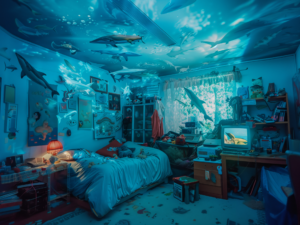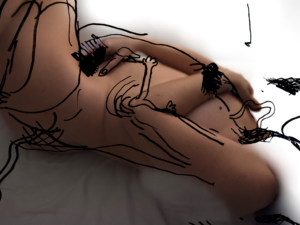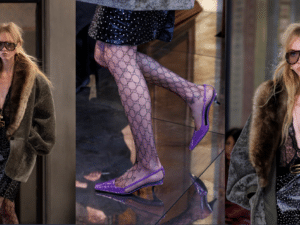BEYOND THE GLASS CEILING
Interview by Dagny Lüdemann
Emmanuelle Charpentier has revolutionised genetic engineering. In her private life, she dreams of deep sea expeditions. She likes androgynously feminine designs by Hedi Slimane. What else makes a woman, predicted to be a future Nobel prize winner, tick?
Her discoveries will change people’s lives. In 2011, the microbiologist Emmanuelle Charpenier published the first groundbreaking research results on the CRISPR/Cas9 Method in Nature Magazine. The following year- with the help of her American colleague Jennifer Doudna- part two of the CRISPR story was released in Science. What may sound complicated describes a fascinating mechanism: Charpentier recognised that bacteria of the strain Streptococcus progenies have a kind of superpower. These germs, which lead to scarlet fever or sore throats in humans, can defend themselves against viruses by cutting out the foreign genetic material that the attackers want to smuggle into our systems, and they also repair the missing section.
This helpful mutation of a virus can be applied to plants, animals, and humans. With these “gene scissors,” we may not only breed healthier seeds and animals to our heart’s content, but hereditary diseases can also be cured, provided that the CRISPR/Cas9 method proves to be secure enough to process the DNA of people (that is, that our genetic makeup would be able to be read like text on a document.)
Charpentier is already world famous: in 2015, the Max Planck Institute for Infectious Biology brought the French woman to Berlin, where she is currently founding an independent institute for research, for which an entirely new lab is being built. Fräulein visited the microbiologist in her new laboratory, and is happy to reveal that it is women in science and its leadership, that are paving the way for a new strain of healthier humans.
Women in science, especially in leading positions, are still a rarity. Not only do you run an institute and are considered a possible Nobel Prize winner, but you are also a University professor, and a lecturer at numerous conferences, of which the majority of attendees are men. Does it matter to you, that you have managed to achieve all of this as a woman?
I hardly think about that. But I know those moments, when you feel feels invisible in a discussion. Or when you hear a stupid pick up line. This happened more often to me as a student when I wore shorter skirts or heels, but I’ve always been good at handling it. Since the CRISPR/Cas9 thing, I meet men as well as women with much greater respect for me. In the past, I was less appreciated for my work, but then again, neither were my male colleagues, not working on anything groundbreaking.
Are you conscious today about what you wear on the job? How would you describe your style?
I am interested in fashion design, when it’s handmade. My mother used to design and sew dresses for me and my sisters. Of course, an outfit should match the occasion and be functional for the job you are doing. I never had the desire to be completely subordinate. My outfits tend to have a bit of a rock’n’roll touch. I had this black eyeliner on as a teenager and never stopped.
Are there designers whose work particularly inspires you?
Several! I really like the collections that Hedi Slimane made for Saint Laurent. Now he is chief designer at Celine. And Anthony Vaccarello, the new designer at Saint Laurent, I think he is great too.
Do you find yourself hiding these interests of fashion and music when you’re at work in the lab, out of fear that they may be considered superficial by your fellow researchers?
No, never. I know a lot of scientists who are enthusiastic about all kinds of things. But, I also work in a very focused and determined way, constantly looking for new challenges. I hardly allow myself to be distracted. And there is this urge to question everything more deeply.
Those are all characteristics that must have been useful for you to get the last component of your CRISPR/Cas9 trick out of the bacteria. But does all this help when you suddenly have to lead people and run an entire institute?
I used to think that this was not for me. But when the time came, I realized that I was a natural. Do I lead differently than a man in everyday life? Probably. But in the end, it depends more upon the personality than on the gender.
Is science the greatest love of your life or why is it forever your number one?
Wow, my greatest love… I’d say that’s life itself, with all its various aspects. Of course, I’d like more time. But I’m betting on becoming pretty old. I know so many scientists over 90 who are very active. I think I’m still going to be doing some great things later in life than most other people. So for that, I keep myself fit.
Is there a life for you after research?
If you mean, will I start a family..? Probably not. And taking little vacations? That’s not for me either. But I do see myself on adventurous expeditions: climbing peaks or deep sea diving. But I would also like to contribute something social. I would like to engage myself and establish a foundation.
As a young girl, did certain idols shape you?
Besides intellectuals, I think of such idols as Marie Curie or Simone de Beauvoir. Or the women I would watch on American TV in they 80s, like Supergirl, The Seven Million Dollar Woman or Charlie’s Angels. The women in it were free, courageous, strong and smart. They were respected, feminine and sexy, and they had a lot of fun. I think these series drew the vision of an emancipated, happy and peaceful world, as the hippies of 1968 would have dreamed it. Men were also enthusiastic. Only it seems to me that over the decades, a certain disillusionment occurred. Many things have probably not gone the way they were supposed to.
Besides everything you have achieved, you also have experienced the downsides that come with the huge success as a researcher. In front of the US courts, lawyers are presenting a hard dispute about patents. Feng Zhang from the Massachusetts Institute of Technology (MIT) applied (after your article was published in Science)– with the geneticist George Church from Harvard claiming the patents of CRISPR/Cas9 to cells of mice and humans as their own separate research, not based on yours and Jennifer Doudnas.
That’s an experience I would have gladly done without. Two women are now fighting against a team of men for patents and, ultimately, for a lot of money. Whereby this is a coincidence and has no meaning in the dispute, it’s still written in the stars how it will turn out. The core of the dispute is reliant upon complicated American patent law.
Why haven’t more women been working in higher positions in research and science?
This is certainly due to the structures that are changing too slowly, perhaps especially in Germany.
As a Frenchwoman, I am shocked when I see how difficult it is for parents to find an all-day childcare, even in Berlin. In addition, that Sundays and late evenings most
supermarkets are closed… such circumstances make it difficult to organize life with children around the job, let alone to organise your own life.
As the boss, are you shaping your new Institute to be more family-friendly?
I try to. Flexible working hours are important. I don’t care when someone does something as long as it gets done. My impression is – independent of external circumstances – that more women and men from the younger generation are falling back into traditional roles. Especially amongst those who have grown up sheltered, or largely without any financial worries. There seems to be a great need for security and consistency.
What could be the reason for this?
I ask myself the same question. Perhaps it is more difficult to assert oneself in a world in which everything seems possible. But at the same time , there is more possibility and fear of doing things wrong. This is probably especially true for young men at the moment.



